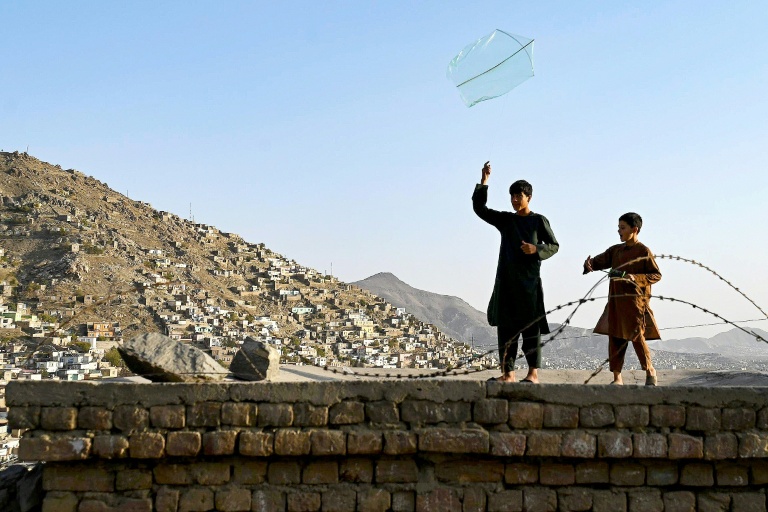Science
Afghans Abroad Struggle to Connect Amid Internet Blackout

Afghans living abroad are facing heightened anxiety as a Taliban-imposed internet blackout severely limits communication with their families back home. Since the blackout began on Monday, internet connectivity in Afghanistan has plummeted to less than one percent of normal levels, according to internet governance watchdog Netblocks. The Taliban’s directive, which will remain in effect “until further notice,” exacerbates an already dire humanitarian situation in one of the world’s poorest countries.
The blackout is particularly distressing for individuals like Mehdi, a 29-year-old restaurant worker in Pakistan. He has been unable to reach his mother, sisters, and brothers despite multiple attempts to call them. “I don’t know how they survive and how they live,” he shared with AFP. The inability to communicate also complicates his efforts to send financial support to his family, heightening concerns about their wellbeing.
Impact on Families and Human Rights
The Taliban’s leader, Hibatullah Akhundzada, has enforced the blackout as part of a broader strategy to combat what authorities label as “vice.” This measure significantly restricts access to social media, limits educational opportunities for women, and censors the media. The United Nations has characterized the situation as “very dire” with “serious human rights ramifications,” underscoring the potential long-term effects on the Afghan population.
“Nooriya Qaderi,” a 59-year-old Afghan refugee in New Delhi, expressed her family’s anxiety, stating, “Because of these problems I can’t talk to my family… everyone is worried.” Similarly, Khwaja Zamiruddin, a 34-year-old restaurant manager in India, lamented the difficulties of communication and the challenges of sending money home. “There are so many challenges. No one knows how long the blackout will go on for,” he remarked.
Global Concerns and Future Implications
Internet access in Afghanistan was previously expanding, with approximately 13.2 million people connected at the start of 2025, representing around 30.5 percent of the population, according to DataReportal. Social media users numbered approximately 4.05 million. The abrupt cut in connectivity raises questions about the implications for the population’s access to information, education, and financial resources.
Rahimullah Habiboghli, a young Afghan who moved to France five years ago, pointed out the absurdity of the situation. “I can’t believe it. It cannot last; it’s just not possible. No country in the world is completely cut off from the internet,” he stated. As the founder of an organization dedicated to promoting education in Afghanistan, he has relied on raising funds to support his initiatives, a practice now jeopardized by the blackout.
Previously, in 2024, the Afghan government had promoted its extensive 9,350-kilometre (5,800-mile) fibre optic network as a significant achievement for connecting the country to the global community. Habiboghli criticized the Taliban’s actions, suggesting they aim to keep the population uninformed, which could help maintain their grip on power.
As concerns continue to mount, the international community watches closely, recognizing the profound impact of the Taliban’s decision on millions of Afghans at home and abroad.
-

 Education2 months ago
Education2 months agoBrandon University’s Failed $5 Million Project Sparks Oversight Review
-

 Lifestyle3 months ago
Lifestyle3 months agoWinnipeg Celebrates Culinary Creativity During Le Burger Week 2025
-

 Science3 months ago
Science3 months agoMicrosoft Confirms U.S. Law Overrules Canadian Data Sovereignty
-

 Health3 months ago
Health3 months agoMontreal’s Groupe Marcelle Leads Canadian Cosmetic Industry Growth
-

 Science3 months ago
Science3 months agoTech Innovator Amandipp Singh Transforms Hiring for Disabled
-

 Technology3 months ago
Technology3 months agoDragon Ball: Sparking! Zero Launching on Switch and Switch 2 This November
-

 Education3 months ago
Education3 months agoRed River College Launches New Programs to Address Industry Needs
-

 Technology3 months ago
Technology3 months agoGoogle Pixel 10 Pro Fold Specs Unveiled Ahead of Launch
-

 Technology1 month ago
Technology1 month agoDiscord Faces Serious Security Breach Affecting Millions
-

 Business2 months ago
Business2 months agoRocket Lab Reports Strong Q2 2025 Revenue Growth and Future Plans
-

 Science3 months ago
Science3 months agoChina’s Wukong Spacesuit Sets New Standard for AI in Space
-

 Education3 months ago
Education3 months agoAlberta Teachers’ Strike: Potential Impacts on Students and Families
-

 Technology3 months ago
Technology3 months agoWorld of Warcraft Players Buzz Over 19-Quest Bee Challenge
-

 Business3 months ago
Business3 months agoNew Estimates Reveal ChatGPT-5 Energy Use Could Soar
-

 Business3 months ago
Business3 months agoDawson City Residents Rally Around Buy Canadian Movement
-

 Education3 months ago
Education3 months agoNew SĆIȺNEW̱ SṮEȽIṮḴEȽ Elementary Opens in Langford for 2025/2026 Year
-

 Technology1 month ago
Technology1 month agoHuawei MatePad 12X Redefines Tablet Experience for Professionals
-

 Technology3 months ago
Technology3 months agoFuture Entertainment Launches DDoD with Gameplay Trailer Showcase
-

 Business3 months ago
Business3 months agoBNA Brewing to Open New Bowling Alley in Downtown Penticton
-

 Technology3 months ago
Technology3 months agoGlobal Launch of Ragnarok M: Classic Set for September 3, 2025
-

 Technology3 months ago
Technology3 months agoInnovative 140W GaN Travel Adapter Combines Power and Convenience
-

 Science3 months ago
Science3 months agoXi Labs Innovates with New AI Operating System Set for 2025 Launch
-

 Technology3 months ago
Technology3 months agoNew IDR01 Smart Ring Offers Advanced Sports Tracking for $169
-

 Technology3 months ago
Technology3 months agoDiscover the Relaxing Charm of Tiny Bookshop: A Cozy Gaming Escape










